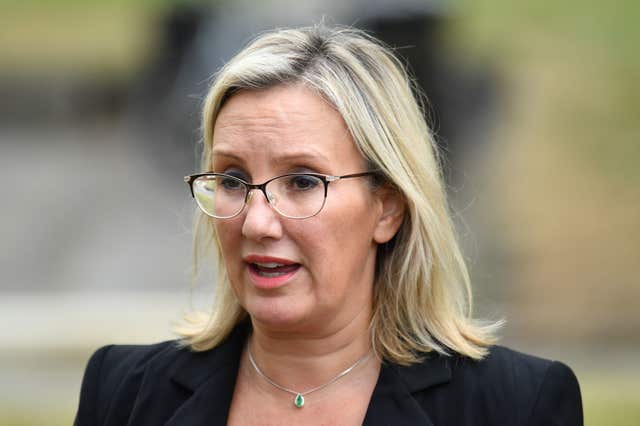Proposals to protect creatives’ copyright from AI rejected by MPs
Technology Secretary Peter Kyle said pitting the creative industries against artificial intelligence was ‘unnecessarily divisive’.

Proposals to protect the creative industries against artificial intelligence (AI) have been rejected by MPs, after Parliament heard both sectors need to succeed to grow Britain’s economy.
Technology Secretary Peter Kyle pledged to set up a series of expert working groups to find a “workable way forward” for both industries, as he urged MPs to reject the Lords’ amendment.
Peers attempted to amend the Data (Use and Access) Bill by adding a commitment to introduce transparency requirements, aiming to ensure copyright holders are able to see when their work has been used and by who.
MPs voted 195 to 124, majority 71, to disagree with Baroness Beeban Kidron’s transparency amendment, in a bid to end the so-called ping-pong.
Speaking in the Commons, Mr Kyle said: “Pitting one against the other is unnecessarily divisive and damages both.
“The truth is that growing Britain’s economy needs both sectors to succeed and to prosper. Britain has to be the place where the creative industries, and every bit as much as AI companies, can invest, grow, are confident in their future prosperity, that is assured.
“We have to become a country where our people can enjoy the benefits and the opportunities of both.”

He added: “It is time to tone down the unnecessary rhetoric and instead, recognise that the country needs to strike a balance between content and creativity, transparency and training, and recognition and reward.
“That can’t be done by well-meaning, but ultimately imperfect amendments to a Bill that was never intended to do such a thing.
“The issue of AI copyright needs properly considered and enforceable legislation, drafted with the inclusion, the involvement, and the experience of both creatives and technologists.
“To that end, I can tell the House that I am now setting up a series of expert working groups to bring together people from both sectors, on transparency, on licensing and other technical standards to chart a workable way forward.”
Intervening, Labour MP James Naish said many of his constituents in Rushcliffe feel “AI development has already trampled over their rights”, adding: “This is a time-limited issue and action is required.”
Mr Kyle said it is “the truth that so much content has already been used and subsumed by AI models, usually from other territories and also under the current law”.
Chairwoman of the culture, media and sport committee Dame Caroline Dinenage said: “What rights holders need is what this amendment says – clear, relevant, accurate and accessible information about the use of their copyright works and the means by which they’re assessed.
“That’s exactly what it says here, a legislative vehicle in the future, however welcome, is going to be simply too late to protect the livelihoods of so many of the UK’s 2.5 million creative workers.”
The Conservative MP for Gosport added: “Is the Government really committed to proactively enforcing our copyright and if not through this Bill and now, how and when?”
Mr Kyle replied: “We need to make sure that we can have a domestic legal system that is fit for the digital age.”
He added that he wanted to “give the certainty in words, but also, most importantly, to give the certainty in legislation in the most rapid fashion possible, so that creatives and the AI sector can move forward together”.
Conservative MP Joe Robertson (Isle of Wight East) said: “He talks about delivering certainty, but does he not see that the certainty he is giving is to large, multinational tech companies to get away with scraping original content that is copyrighted.
“But he is going to give them the certainty through this Bill to abuse the rights of creatives.”
Mr Kyle replied: “I am confused by his intervention. The Bill before us does not mention AI, it does not mention copyright, it has nothing to do with any of those items.”
SNP MP Pete Wishart (Perth and Kinross-shire) accused the Government of offering creators “nothing”, adding: “I’ve looked at this amendment the Lords presented, it seems a reasonable amendment, what is wrong with it as a way forward?”
Mr Kyle said: “It is my belief, and it is this Government’s belief, that there is a better way forward to give the protections that creative sectors and creators need, and that will deliver them the certainties, protections and the ability to see transparency.”
“We need to take these issues in the round, not one part of it,” he added.
Mr Kyle continued: “Much of the creative content on the internet has already been scraped elsewhere in the world. We cannot turn back time nor should we kid ourselves that we can exercise extraterritorial reach that we simply do not have.
“My determination is to get this absolutely right, not just rush it right now to make ourselves feel better but make no real improvements to the status quo. So let me be absolutely clear to the House – I get it and I will get it right.”
Shadow technology minister Ben Spencer said he welcomed the “huge benefits” which the Bill would have on the economy and public services, but added: “I fear this Bill will go down in the Government’s record as the Bill of missed opportunities.
“A missed opportunity to fix our flawed public datasets which present a barrier to tracking and tackling inequalities in areas such as women’s health, a missed opportunity to commit to a review of protections for children and their use of social media platforms, and to commit to taking action to increase those protections where the evidence shows there’s good reason.
“And a missed opportunity to provide much-needed certainty to two of our key growth industries – the creative and AI sectors – over how they can interact to promote their mutual growth and flourishing.”





